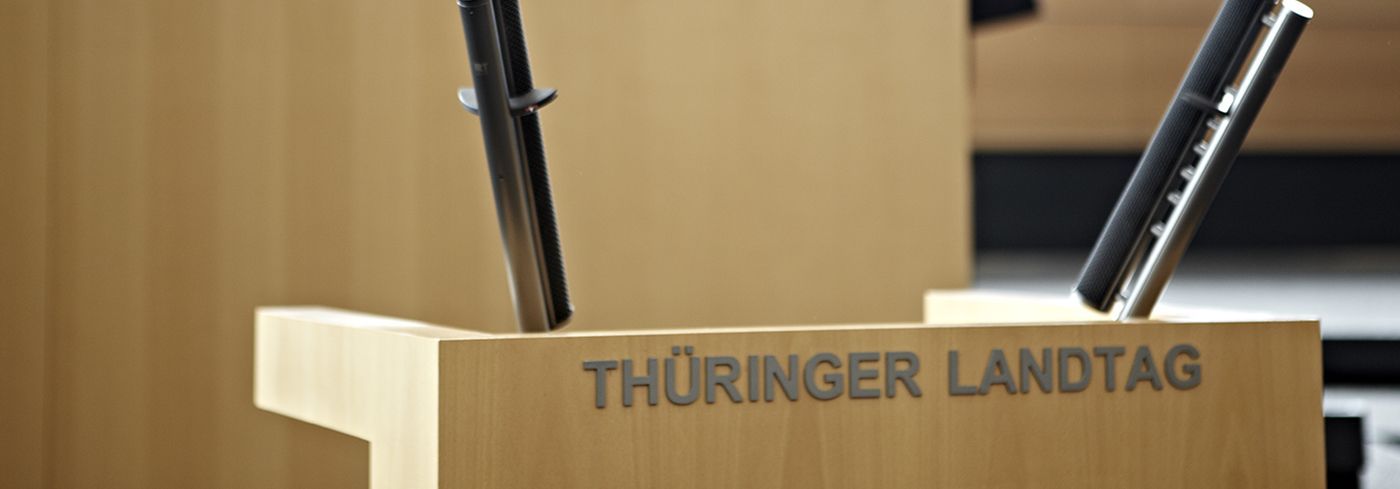
Legislation
Bills can be proposed by the state government, from within the Landtag itself or by way of petition for a referendum (Article 81 of the Landesverfassung). Legislative initiatives from within the Landtag may only be exercised by a parliamentary group or by at least 10 parliament members. A bill proposed to the Landtag by way of a petition for a referendum must be approved within 2 months by 8% of those entitled to vote (official session) or within 4 months by 10% of those entitled to vote (open session).
Bills usually undergo deliberation (readings) twice in the plenary session of the Landtag. Only laws that affect the constitution have to undergo deliberation a third time. Fundamental aspects of the proposed bill are presented during the first reading. Afterwards, the plenary session votes on whether the bill will be referred to committees. If a bill is referred to multiple committees, one committee is appointed as central coordinator.
The committees are responsible for preparing the resolutions of the Landtag. They examine the bill from every conceivable perspective. The respective minister or his or her deputy (undersecretary) and ministry officials also take part in deliberations. To obtain information, the committees are permitted to conduct hearings that are generally open. In this case experts, interest groups and other parties with relevant information are heard with regard to the issues under consideration. The coordinating committee makes a final decision on the recommendation that will be presented to the plenary session for decision-making. It also decides which proposals of the other deliberating committees are to be included in the recommendation.
The second reading begins with a report given by a member of the coordinating committee, followed by deliberation and voting. During the second reading, the Landtag can refer the bill back to a committee. One of the special rights that the individual parliament members have includes the possibility to make a motion for amendment during the second reading.
The second reading usually ends with a final vote that determines whether the bill is approved or rejected, provided a third deliberation is not prescribed or ordered. Bill enactment usually requires a simple majority of votes of the parliament members present; laws affecting the constitution must be adopted by a two-thirds majority of votes of the members of the Landtag. If the Landtag does not accept a bill submitted by way of petition, a referendum must be carried out with regard to the petition and an alternative draft presented by the Landtag, if applicable.
Bills can be proposed by the state government, from within the Landtag itself or by way of petition for a referendum (Article 81 of the Landesverfassung). Legislative initiatives from within the Landtag may only be exercised by a parliamentary group or by at least 10 parliament members. A bill proposed to the Landtag by way of a petition for a referendum must be approved within 2 months by 8% of those entitled to vote (official session) or within 4 months by 10% of those entitled to vote (open session).
Bills usually undergo deliberation (readings) twice in the plenary session of the Landtag. Only laws that affect the constitution have to undergo deliberation a third time. Fundamental aspects of the proposed bill are presented during the first reading. Afterwards, the plenary session votes on whether the bill will be referred to committees. If a bill is referred to multiple committees, one committee is appointed as central coordinator.
The committees are responsible for preparing the resolutions of the Landtag. They examine the bill from every conceivable perspective. The respective minister or his or her deputy (undersecretary) and ministry officials also take part in deliberations. To obtain information, the committees are permitted to conduct hearings that are generally open. In this case experts, interest groups and other parties with relevant information are heard with regard to the issues under consideration. The coordinating committee makes a final decision on the recommendation that will be presented to the plenary session for decision-making. It also decides which proposals of the other deliberating committees are to be included in the recommendation.
The second reading begins with a report given by a member of the coordinating committee, followed by deliberation and voting. During the second reading, the Landtag can refer the bill back to a committee. One of the special rights that the individual parliament members have includes the possibility to make a motion for amendment during the second reading.
The second reading usually ends with a final vote that determines whether the bill is approved or rejected, provided a third deliberation is not prescribed or ordered. Bill enactment usually requires a simple majority of votes of the parliament members present; laws affecting the constitution must be adopted by a two-thirds majority of votes of the members of the Landtag. If the Landtag does not accept a bill submitted by way of petition, a referendum must be carried out with regard to the petition and an alternative draft presented by the Landtag, if applicable.

